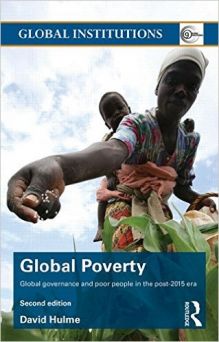Global Poverty: Global governance and poor people in the post-2015 era (2nd edition)

In this updated version, David Hulme uses methods and concepts from economics, politics, sociology and geography to further elaborate on major debates on the political economy surrounding global poverty eradication and sustainable development agendas.
The author takes on several challenges in analysing how ideas, policies and practices on poverty eradication travelled geographically and historically from international development towards sustainable development for all. He also dissects how extreme poverty, human rights and global inequity constitute different foci with implications for which global social goals are to be achieved, how, and what this implies in terms of institutional configurations.
The book uses boxes to illustrate and contextualize specific concepts like global poverty lines, liberalism or extreme poverty. It also uses bullet points and quotes, which in sum provide for a clearly structured reading experience despite its dense and data-rich content.
Starting with the history and geography of global poverty, and with the provision of conceptual building blocks, the first few chapters give insight into the complexities of why poverty occurs and how interventions are influenced by a changing institutional landscape.
Chapter 4 then focuses on the practices of poverty eradication and elaborates on the full public policy cycle, from the decision-making process to the actual implications on the ground. The author argues that in the past 15 years, practices of international development have not significantly transformed despite a changing global rhetoric. However, he sees gradual progress, mostly related to the micro level and new partnering strategies, and argues:
“At the heart of this nexus of grand statements and limited actions lie accountability processes. These have remained resilient to change. With relatively few exceptions, national governments and leaders in poor and rich worlds can make promises about poverty reduction targets and actions and know that they will not be held to account by their citizens or put under pressure because of non-compliance with international norms.”
The following chapters than provide a forward-looking perspective, by examining strategies for the post-2015 development agenda (Chapter 5) and emerging global issues and trends, like the roles of Asia, climate change, and urbanization (Chapter 6). The author also asks how we can move from so little attention to the global governance of poverty (see Chapter 7, with an interesting analysis on the progress of the Millennium Development Goals) to a caring, more effective way of promoting international norms to end poverty (Chapter 8).
In sum, this book offers an analysis of the ideas, institutions and material capabilities that surround global poverty reduction efforts. While acknowledging that small and micro-scale social actions have improved the lives of the poor, it calls for a move towards more concerted efforts, particularly on national and international levels, that pay attention to the agency of the poor, challenge current elites, think strategically and act practically.
Book note prepared by Julia Wesely
Search the Book notes database
Our Book notes database contains details and summaries of all the publications included in Book notes since 1993 - with details on how to obtain/download.
Use the search form above, or visit the Book notes landing page for more options and latest content.
For a searchable database for papers in Environment and Urbanization, go to http://eau.sagepub.com/

